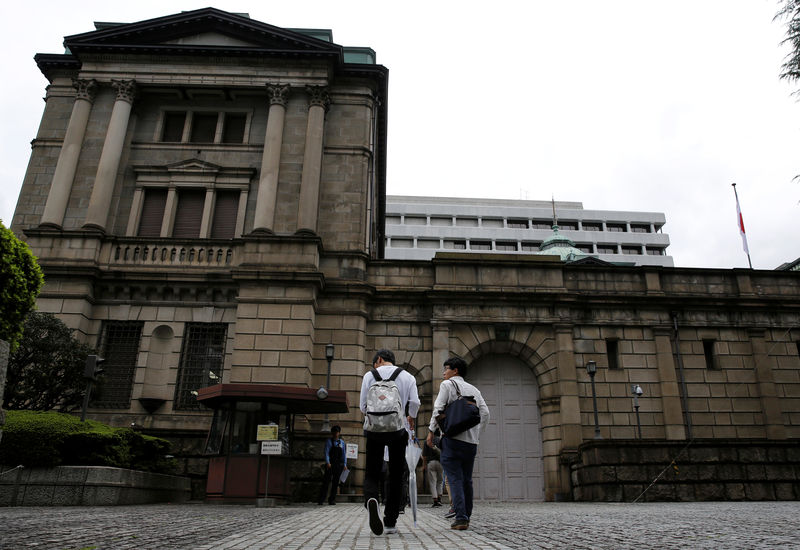 © Reuters. Men walk toward the Bank of Japan (BOJ) building in Tokyo
© Reuters. Men walk toward the Bank of Japan (BOJ) building in TokyoBy Leika Kihara
TOKYO (Reuters) – Japan should ensure that spending measures to ease the pain on the economy from next year’s scheduled sales tax hike are temporary and well-communicated, a senior International Monetary Fund official said on Monday.
Paul Cashin, the IMF’s mission chief for Japan, also said the country’s central bank should maintain its massive stimulus despite the rising costs, including the strain on regional banks’ profits from near-zero rates.
“In our view, the so-called side-effects are not large enough to outweigh the benefits at present,” he said, adding that the Bank of Japan should continue to focus on achieving its 2 percent inflation target.
“The only game in town is achieving the target. Tightening now is not going to help you get there. They’re very much committed to reaching the target, and we think that’s the right thing to do,” Cashin told Reuters.
Prime Minister Shinzo Abe has pledged to proceed with a twice-delayed increase in Japan’s sales tax rate to 10 percent from 8 percent in October next year, as part of efforts to rein in the country’s burgeoning public debt.
Flexible fiscal policy and aggressive monetary easing have been the key pillars of the premier’s “Abenomics” policies aimed at pulling the economy out of stagnation. Many analysts say Abe has failed to deliver the third arrow of Abenomics – a strategy to boost Japan’s potential growth such as through reforms to the labor market.
However, the government, keen to avoid another recession, is planning to give tax breaks for car and home buyers to mitigate the negative impact from the tax hike on the economy.
Cashin said the IMF welcomes the government’s spending plans as they would help ease economic volatility after the tax hike.
But he said the measures should target low-income households and be implemented with a set timeframe, so more revenues from the sales tax hike will be used to pay back debt.
“We’re not against putting them in and some of the revenue can be used for (tax breaks) but only on a temporary, time-bound basis,” he said.
“Equally important is clear communication on what these measures are, when they will begin and what particular tax and subsidies will be involved … because people plan ahead and won’t wait until October to make consumption decisions.”
Japan’s aging and shrinking population also increases challenges for policymakers, such as by eroding regional banks’ profits and diminishing the effect of monetary easing, he said.
Because an aging population pushes down Japan’s potential growth, it would make the BOJ’s job more difficult by requiring stronger monetary support to reflate growth, Cashin said.
“Demographics is doing battle with Abenomics,” he said.
“Is proper firing of the third arrow going to be enough to push back the demographic wave? We would say no, but it would certainly help a great deal.”
Fusion Media or anyone involved with Fusion Media will not accept any liability for loss or damage as a result of reliance on the information including data, quotes, charts and buy/sell signals contained within this website. Please be fully informed regarding the risks and costs associated with trading the financial markets, it is one of the riskiest investment forms possible.
Source: Investing.com



























